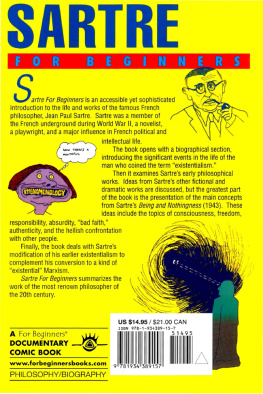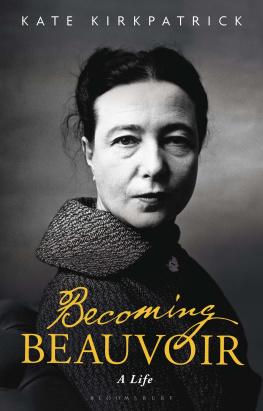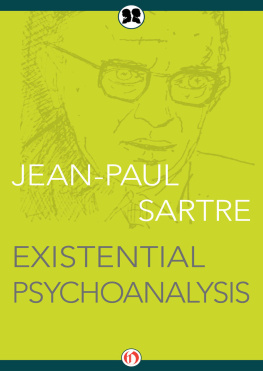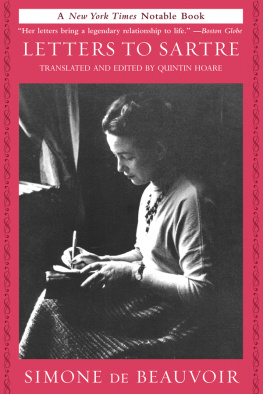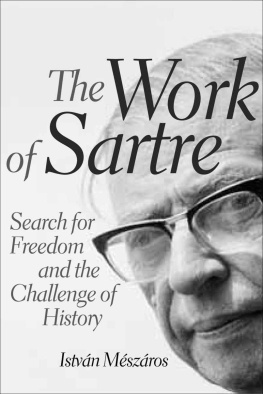Titles in the series Critical Lives present the work of leading cultural figures of the modern period. Each book explores the life of the artist, writer, philosopher or architect in question and relates it to their major works.
In the same series
Michel Foucault
David Macey
Jean Genet
Stephen Barber
Pablo Picasso
Mary Ann Caws
Franz Kafka
Sander L. Gilman
Guy Debord
Andy Merrifield
Marcel Duchamp
Caroline Cros
Frank Lloyd Wright
Robert McCarter
James Joyce
Andrew Gibson
Jean-Paul Sartre
Andrew Leak

REAKTION BOOKS
Published by Reaktion Books Ltd
33 Great Sutton Street
London EC1V ODX, UK
www.reaktionbooks.co.uk
First published 2006
Copyright Andrew Leak 2006
All rights reserved
No part of this publication may be reproduced, stored in a retrieval system, or transmitted, in any form or by any means, electronic, mechanical, photocopying, recording or otherwise, without the prior permission of the publishers.
Page references in the Photo Acknowledgements and Index match the printed edition of this book.
Printed and bound in Great Britain
by CPI/Bath Press, Bath
British Library Cataloguing in Publication Data
Leak, Andrew N., 1956
Jean-Paul Sartre. (Critical lives)
1. Sartre, Jean Paul, 19051980 2. Philosophers France Biography
I.Title
194
ISBN 1 86189 270 5
Contents

Jean-Paul Sartre in 1946.
Preface
Following the appearance of the first three volumes of his biographical study of Flaubert, Sartre remarked that, had he been able to spend just fifteen minutes in the company of the great novelist, he would have been able to learn more about him than by reading his entire voluminous correspondence. (Of course, this assumes that Sartre would have been capable of remaining fifteen minutes in Flauberts company, as he was also convinced that Flaubert was a crushing bore!) Like Freud, or like the Buddhists who were capable of finding the whole world in a bean, Sartre fancied that the whole of a subjects personality was present at age fifteen or fifty in his every gesture or glance; existentially, if not ethically, drinking tea rather than coffee, scratching ones ear with the index finger rather than the auricular, preferring sauerkraut to oysters are as significant as stealing from ones parents, talking under torture, abandoning a pregnant partner, or devoting ones life to writing Of course, no biographer or critic will ever again be able spend fifteen minutes in Sartres presence, and, as Sartre himself might have said, tant mieux!
When I first embarked on serious study of Sartre, friends and mentors suggested that I might take myself off to Paris to meet him. I have to confess that I felt a certain relief when, six months later, Sartre died. Relief at no longer having to explain, to myself or to others, why I felt no desire or curiosity to meet him: the definitive two metres of texts on my bookshelf surely contained more of Sartre than I might hope to find in a blind old man dying in a Montparnasse apartment. Twenty-five years on, the two metres have become two-and-a-half, as Sartre has continued to expand and mutate with each posthumous publication. Not only that: with each notable anniversary and none could be more notable than the recent centenary of his birth witnesses to his life, both real and purported, partisans and detractors, critics and exegetes, have rolled up to provide the illustrious zombie with ever more textual prosthetics. Sartre long since left Kafka and Borges, Joyce and Proust in his wake as the most written-about twentieth-century author. But why? His works do not possess the spectacular verbal richness of Joyce or Proust, nor do they tease their readers, like those of Kafka or Borges, with the promise of a meaning always on the point of disclosure. The question as to why Sartre and his work have stimulated so many readers to read, so many writers to write, so many thinkers to think and so many critics to critique is one that is surely worth considering. Had Sartre worked all his life as a librarian in Buenos Aires or toiled as an obscure clerk in a Mitteleuropa insurance agency, I doubt his works would have attracted the readership they did; which is to say that his work, more than any other, has become inseparable from the image of the man himself.
This book does not propose a radical re-evaluation of the Sartrean corpus: the readings are my own, but I am not the only one to have read in this way. My aim is to sketch the ways in which a life may become written by the one who is living it, by those who share it and by those who come after; to explore what is at stake in such a writing; and, finally, to suggest why it may still be worth reading today.
1
A Child in the Hall of Mirrors
One appears to begin at the beginning but the end is already there and it transforms everything. For us, the guy is already the hero of the story.
La Nause
On 17 September 1906 a certain Jean-Baptiste Sartre lay dying in a small farm near Thiviers in southwest France. As the enterocolitis he had contracted seven years earlier in China closed down his body, he would doubtless have been perplexed to learn that 80 years hence an assiduous scholar would visit his birthplace, scrutinize records of his naval career, and read letters he had written home from his overseas postings in an attempt to find out what kind of man he had been. What had he done to deserve such attention? Nothing but his duty his duty as a husband, that is: one day in the autumn of 1904 he had inseminated Anne-Marie Sartre, ne Schweitzer, whom he had married the previous May. The issue of this immense stupidity was at that moment in September 1906 giving vent to his resentment in the home of the wet nurse where he had been placed in order to allow his mother to devote her energies to nursing her dying husband. The baby, born on 21 June 1905 and baptized Jean-Paul-Charles-Aymard Sartre, would one day become Sartre, thus rescuing his father from oblivion and endowing him with a kind of vicarious immortality: the son gives birth to the father. But when, half a century later, Sartre came to put his own life into words, his father merited no more than a few lines: Even today, I am amazed at how little I know about him. And yet, he loved, he tried to live, he found himself dying; that is enough to make a whole man. We should not be misled by the terseness of this obituary: to learn to be a whole man is no little thing in Sartres view of humanity.
The death of Jean-Baptiste left Anne-Marie virtually without financial support and without a roof over her head, so she went back to live with her parents in Meudon. Her father, Charles Schweitzer, had taken early retirement from teaching, but with extra mouths to feed, he rescinded his notice. There was not a word of complaint, everyone behaved impeccably, but the reproaches were no less real for not being articulated: families, of course, prefer widows to young single mothers, but only just.
And so began ten years of happiness for Poulou.
Les Mots (the autobiography that Sartre wrote in his fifties) lays no claim to objective truthfulness. Indeed, after 50 pages, we are disconcerted to read: What I have just written is false. True. Neither true nor false, like everything one writes about madmen, about men. In later years Sartre took to referring to the biographies he wrote as true novels, adding that he would like



